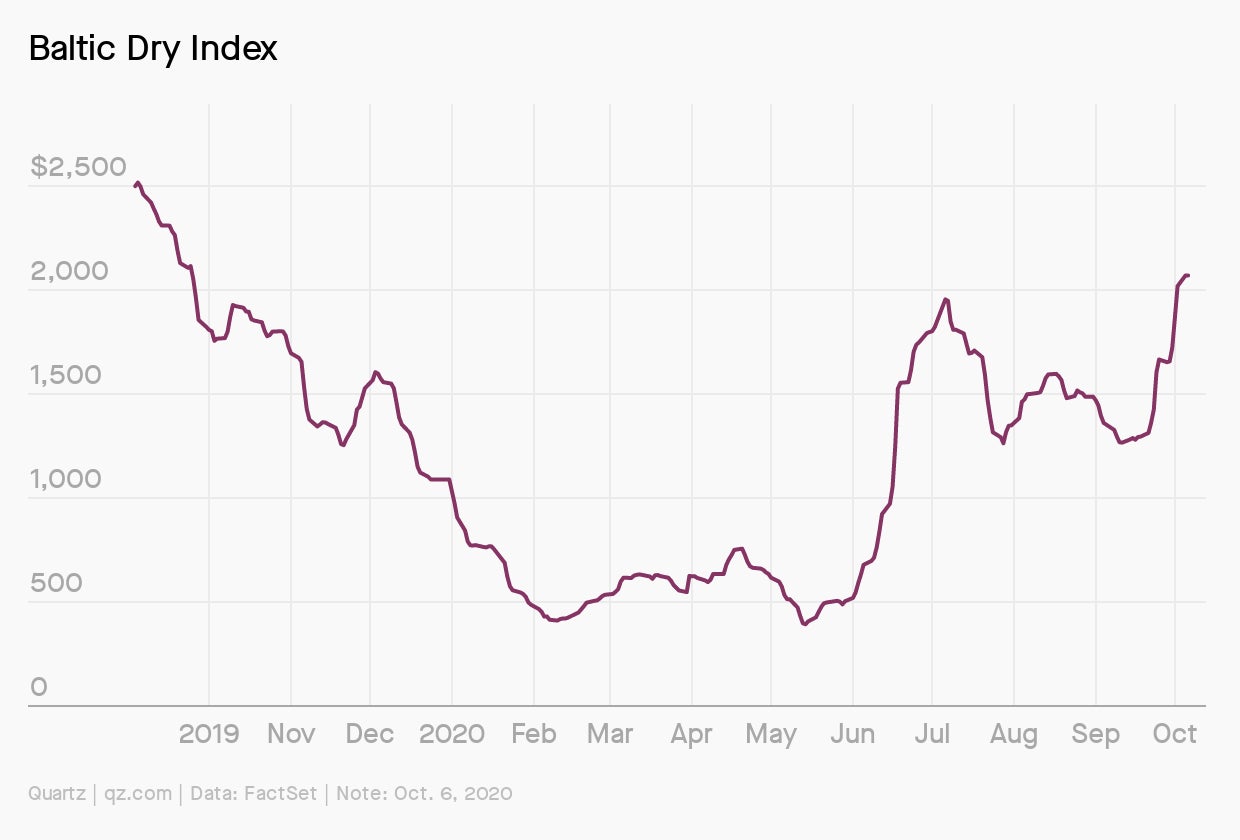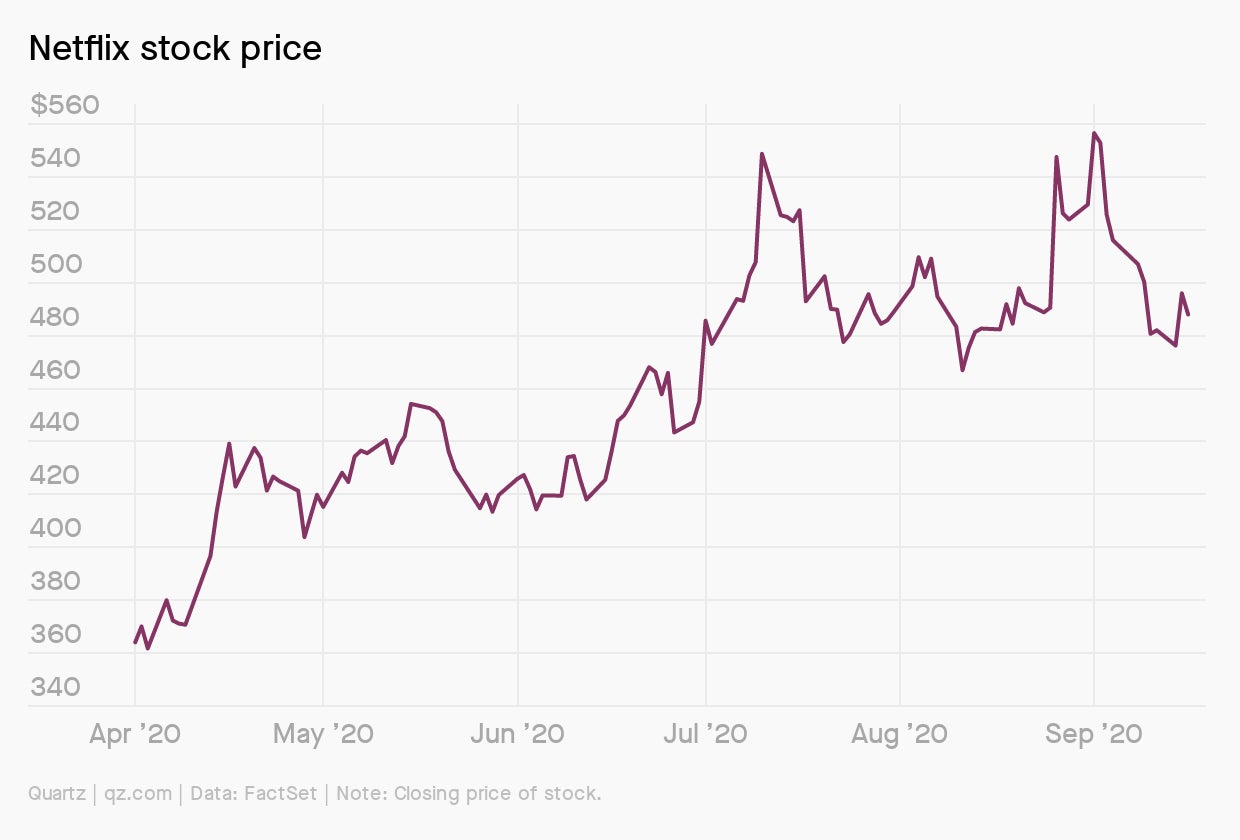Vice-presidential debate, Nobel prizes, sneaky shark
Good morning, Quartz readers!

Good morning, Quartz readers!
Here’s what you need to know
America almost got the debate it deserved. Unlike last week’s Trump-Biden debacle, both Mike Pence and Kamala Harris were essentially civil to one other, but in the end, it wasn’t wildly interesting. That left an opening for a fly that hung out on Pence’s white hair for two long minutes to steal the spotlight and all the memes.
Stock prices rebounded after Donald Trump did a U-turn on bailouts. The US president is refusing to negotiate with Democrats on a larger, more comprehensive package until after the election, but instead called for smaller interventions (paywall), such as assistance for airlines to avoid mass layoffs. He also touted an unproven “cure” for Covid-19.
Crispr’s Nobel prize and IPOs both happened at lightning speed. Emmanuelle Charpentier and Jennifer Doudna‘s prize for chemistry is the first science Nobel ever awarded to two women, and a mere eight years—rather than the usual decades of research—after their discovery was published. The Nobel prize for literature is announced today.
India’s richest man is nearly four times wealthier than his nearest rival. According to the latest Forbes rich list announced today, Mukesh Ambani, chairman of Reliance Industries, is worth nearly $90 billion. The second richest, infrastructure magnate Gautam Adani, has only $25 billion.
Charting the Baltic Dry Index
If you’re not one to keep an eye on the BDI, now’s a good time to give a little attention to this number, which tracks the cost of shipping commodities like iron and coal. Right now, the index is the best illustration of how China is pouring cash into infrastructure, from green energy projects to electrical grids and airports, in an array of stimulus measures that are rippling through global financial markets.

China, of course, has been here before. John Detrixhe breaks down why the country’s spending spree matters.
The joy of indexing
From the number of hours people are working in different countries to changing company stock prices, it’s often necessary to compare numbers on very different scales. The key to doing this well is indexing. When data points are indexed, they are all compared to their level at some particular point time.
Consider stock market investing. Let’s say a friend, bored during the Covid-19 lockdown, decided to start buying stocks through mobile banking app Robinhood, figuring it would make for a fun way to kill time and learn a bit more about the stock market. One of the stocks he bought was Netflix. By mid-September he was quite pleased with himself. Since the beginning of April, when he purchased his shares, the stock price had jumped by 34% to $488, from $364.

How would you truly determine whether he made a good bet? As part of our guide to the data deluge, we wrote an explanation of why indexing is so essential and how you can do it yourself.
✦ We’ve checked the data, and it seems like a Quartz membership could be a good thing for you. Check it out.
Obsession Interlude: Because China
Not that long ago, it used to be pretty common to see overwhelmingly male names explaining developments in China in English-language articles. But a number of efforts have made the work of all sorts of women who focus on China—including political scientists, novelists, and scientists—more visible. Here are a few whose work and lives bridge cultures:
Yangyang Cheng, a particle physicist, writes deeply personal essays on being a US immigrant, her relationship with her mother in China, and her attempts to navigate the vast gulf between the value systems of both countries, often drawing on her scientific background.
Courtney Fung, an assistant professor of international relations at the University of Hong Kong, is an expert on China’s influence in global governance. Count on her to point out, for example, instances of Beijing using international organizations to marginalize Taiwan.
Yan Ge became well known in China after winning awards at an American Idol-style writing competition. Now living in Ireland, Yan has shifted to writing in English—a switch that she says makes your personality “undergo a slight, or probably profound, change.”
Chencheng Zhang, who teaches politics and international relations at Queen’s University Belfast, is fascinated by questions of citizenship, migration, and borders. In this essay, she dissects the rise of the phrase baizuo, or “white left,” on China’s internet.
We’re watching for small changes in China that will have outsize effects elsewhere. Stay up to date with our Because China obsession.
We’re obsessed with comic cons

All dressed up with nowhere to go. If the whole point of what are essentially days-long $300 glorified infomercials is seeing celebs, superheroes, and Cylons in the flesh, is a comic convention still a comic convention if no one shows up? With Star Wars sitting out of all of the online versions, Marvel taking over this week’s New York Comic-Con, and DC Comics hosting its own 24-hour online fan event, there’s no guarantee that these events—at least the ones that fans, vendors, and marketers would recognize—will win out over the villain that is Covid-19. Suit up. The Quartz Weekly Obsession has an industry to save.
You asked about plexiglass
Is plexiglass actually effective in stopping the spread of Covid-19?
The clear barriers are a common sight at many in-person transaction sites these days, including a US vice presidential debate. The partitions principally work by intercepting droplets emitted from someone’s mouth that might contain the virus. They’re also effective at “re-enforcing physical distancing requirements, even when users are unwilling or forgetful” according to Canada’s National Collaborating Centre for Environmental Health.
But physical barriers have their limitations, particularly within, say, a large empty arena in which two politicians are debating. The biggest is that the plexiglass panels could limit ventilation, reducing the air change rate in a given space. Alex Ossola breaks down some knowledge barriers.
Surprising discoveries
Watch a surfer’s close call with a shark. Lifeguards filming with a drone spotted the deadly fish creep up on Matt Wilkinson off the coast of Australia.
Remote work is now an aesthetic. Cole Haan teamed up with Slack for a limited-edition sneaker collection that must have sounded good on paper.
Tasmanian devils are back in mainland Australia. The carnivorous marsupials were reintroduced to forests for the first time in 3,000 years in what researchers called a “soft launch.”
A stolen poetry scroll written by Mao Zedong was found chopped in half. The $300 million artifact went missing last month, and was cut down the middle because someone deemed it too unwieldy.
Letters deciphered in the 17th century were sold for £29,000 ($37,000). The 53 letters were decrypted by a young English chaplain, who went on to become a leading cryptographer.
Our best wishes for a productive day. Please send any news, comments, stolen poetry, and decoded missives to [email protected]. Get the most out of Quartz by downloading our iOS app and becoming a member. Today’s Daily Brief was brought to you by Hasit Shah, Susan Howson, and Max Lockie.